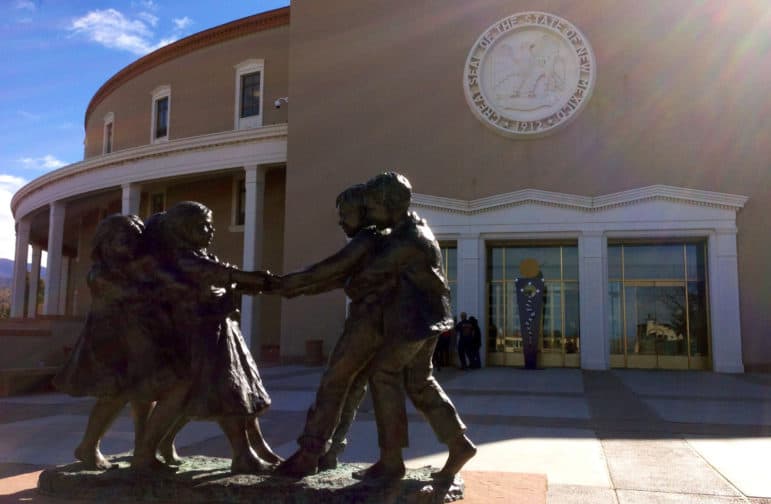
Heath Haussamen / NMPolitics.net
A statue outside the Roundhouse in Santa Fe.
What Republicans called pork, Democrats called crucial funding for communities and public safety.
What Democrats called an effort to modernize accounting practices, Republicans called a gimmick.
Less than a week after Gov. Susana Martinez encouraged lawmakers to work together to solve the state’s projected $69 million budget deficit, the House of Representatives on Saturday waged a partisan fight on two bills to make New Mexico solvent.
Democrats, who control the House 38-32, saw their bills approved in votes that went mostly along party lines. Similar legislation easily cleared the state Senate with bipartisan support.
One House bill would take a total of $80 million from taxes collected on fire insurance, money that is typically divided between fire departments around the state each year. Rather than paying the departments annually, the state would instead distribute new tax revenue periodically during the year. The proposal has raised concerns among fire chiefs, who said the bigger annual payments helped cover major expenses and allowed for more predictable budgeting.
Rep. Patricia Lundstrom, D-Gallup, attempted to assuage those worries by offering an amendment that guaranteed the change would not affect fire departments’ loan repayments and other financial obligations.
Her amendment passed, but Republican lawmakers argued the measure still could harm fire departments.
“The feeling from the rank-and-file firefighters who keep our homes safe is that this is not just an accounting gimmick. This is going to jeopardize their ability to have updated equipment [and] pay the bills,” said Rep. Dennis Roch, R-Logan.
As Lundstrom maintained that the bill was benign, a couple of firefighters sitting in the gallery shook their heads in disagreement with her.
On a second bill to cut costs, Rep. Jason Harper, R-Rio Rancho, proposed an amendment to save an additional $63 million by eliminating funding for public works projects for one year. These funds are divvied up equally between lawmakers each year to pay for projects in their districts.
Calling the projects “pork,” Minority Leader Nate Gentry, R-Albuquerque, said Harper’s proposal would help prevent cuts to public schools.
Harper was less strident. “These projects are well intentioned, but when times are tough, we need to protect essential services first,” he said.
His proposed amendment to strip funding for public works projects triggered an emotional debate of more than two hours.
Democrats said cutting the projects would amount to additional reductions for state agencies and local governments that rely on the funds.
And Rep. Bill McCamley, D-Las Cruces, rattled off a list of pending projects that he said were important to public safety. They included a helicopter for search-and-rescue missions and security for prisons and courts.
“I would not call locks on prisons ‘pork,’ ” McCamley said.
But Republicans seized the debate to depict themselves as standing up for fire departments and schools, casting Democrats as willing to forsake crucial government services to protect projects in their districts.
Rep. Eliseo Alcon, D-Milan, questioned why Republicans were only now proposing to forgo public works projects instead of raising the idea earlier during the fall’s special session or the regular 2016 session when they controlled the House of Representatives.
“How come this thought did not come up at that time?” Alcon asked.
Harper said the idea had only occurred to him in November. “Do I wish I’d had this idea sooner? Yes,” Harper said.
Democrats eventually won the debate, defeating Harper’s amendment 36-30. One of their leaders also criticized the GOP’s tactics, depicting Republicans as breaking the budget and leaving Democrats to fix it.
“House Democrats tried for two years to keep New Mexico out of this dire situation,” Majority Leader Sheryl William Stapleton, D-Albuquerque, said in a statement. “We proposed responsible budget alternatives and measured tax reform proposals to keep us out of this financial abyss.”
The state’s financial crisis leaves no choice but to cast what many described as painful but necessary votes or risk the state facing yet another downgrade in its bond rating and further damage to the reputation of New Mexico’s economy, Democrats said.
“To vote against this or, frankly, amend it and lower our reserves even more is a tremendous, tremendous risk I’m not will to take,” said Rep. Antonio “Moe” Maestas, D-Albuquerque.
Maestas said House members must act quickly to balance the state’s budget so they can begin work in earnest on crafting a spending plan for the next fiscal year beginning in July and prevent even further reductions in spending.
The Senate will still need to act on both budget-cutting measures the House approved Saturday.
In a move that could ease some concerns of school district administrators, the House Appropriations and Finance Committee voted to change a proposal by the Senate for cutting funding provided by the state to local districts. The committee’s version of the bill would not cut any district or charter school by a greater amount than it had in reserves during mid-2016. This could ensure that districts do not have to find money elsewhere in their budgets to make up for the lost funding.
Contact Andrew Oxford at (505) 986-3093 or aoxford@sfnewmexican.com. Follow him on Twitter @andrewboxford.